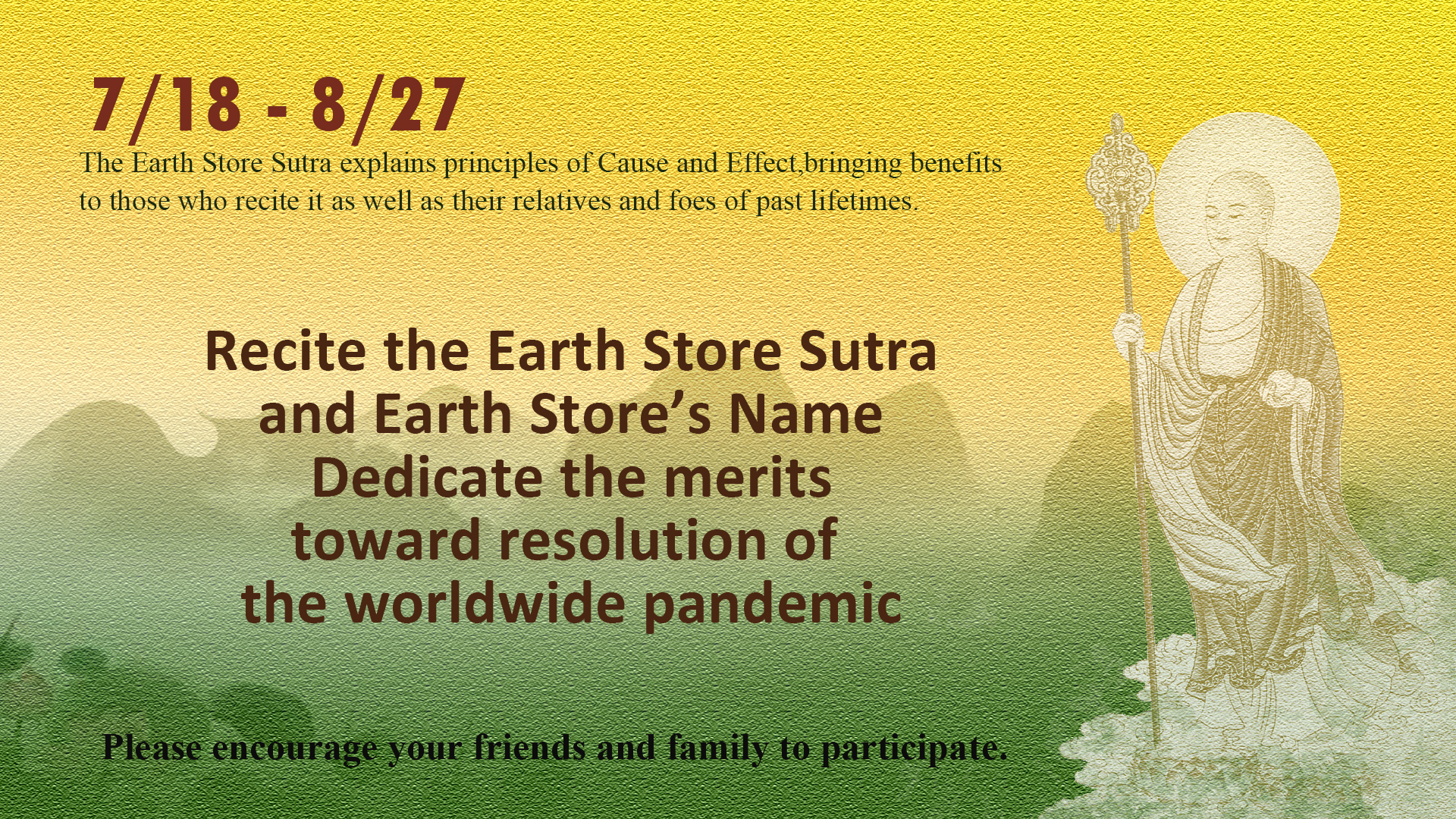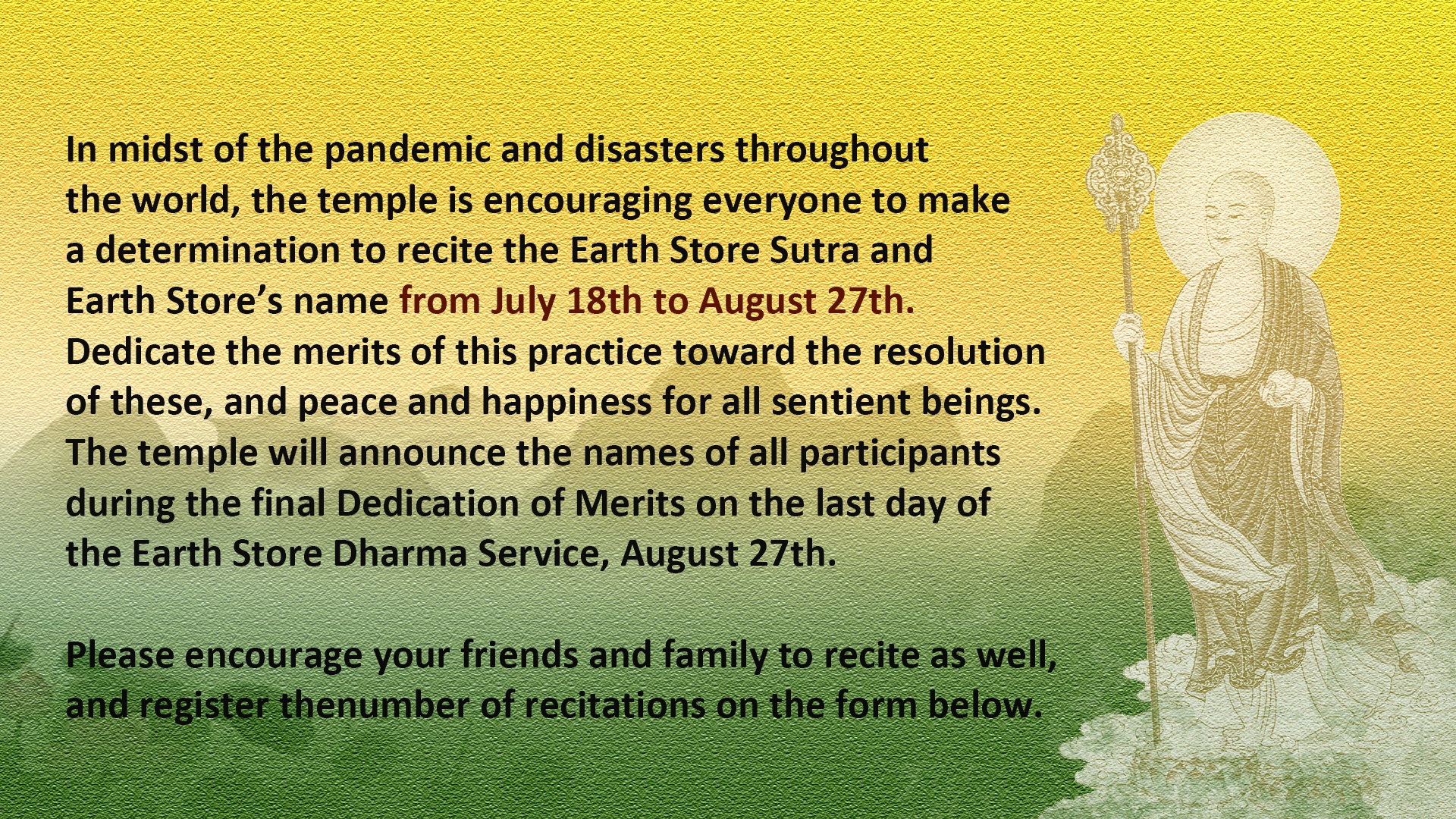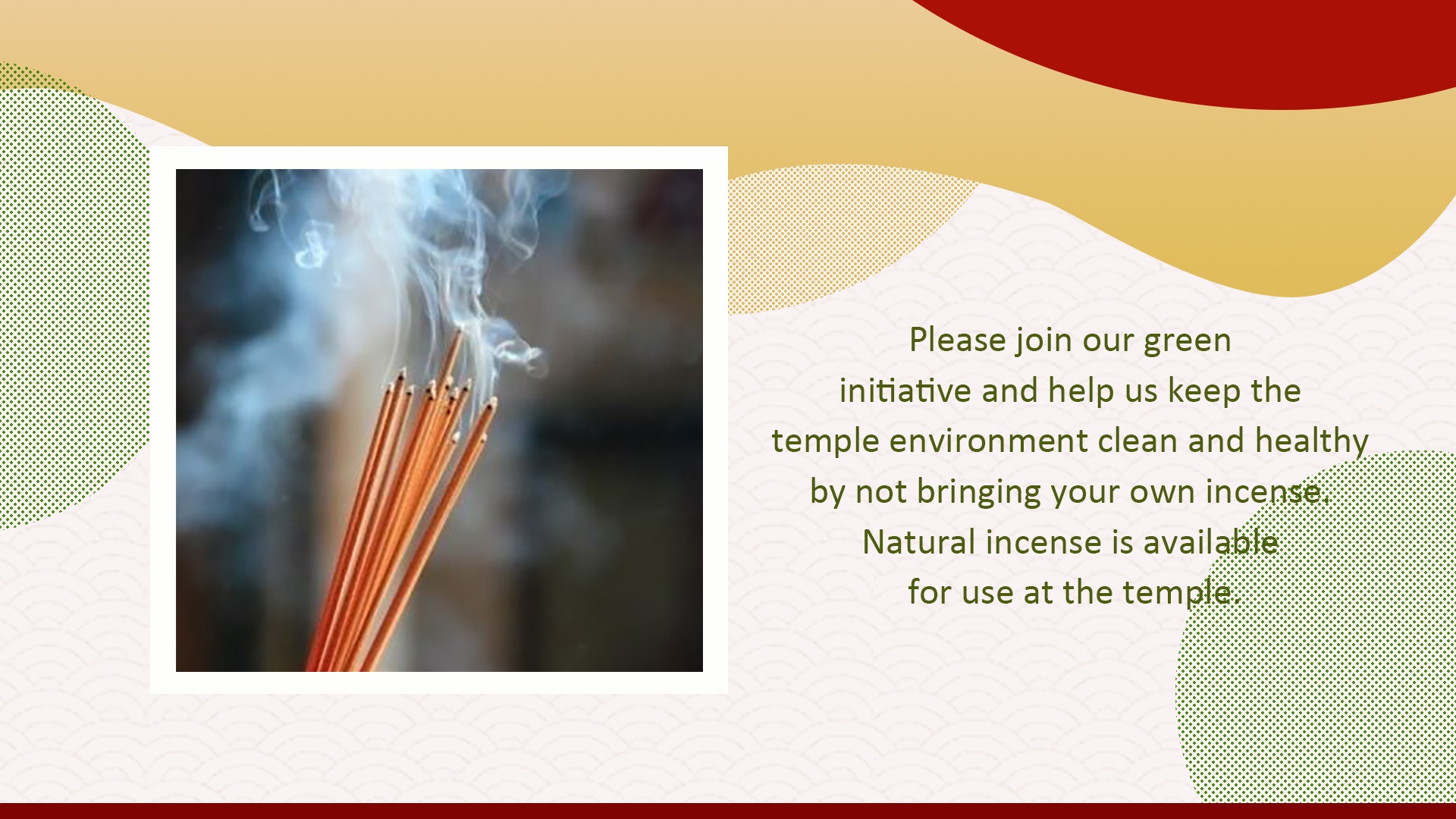
Refuge-Taking Ceremony for Pets
-
Date:
-
Descriptions:Location: Eightfold Path Garden
Please keep your pet animals in their cage or carrier while on temple grounds.
Register online now !
All sentient beings share the same Buddha nature. By guiding your pet animals toward wholesomeness by taking refuge on their behalf, you are helping them plant the seeds of future liberation and reducing the suffering they would otherwise undergo in the cycle of birth and death.
You are welcome to bring your dearest pet animals to personally participate in the Refuge-taking Ceremony. If it is inconvenient to do so, you may also participate online.
-
Calendar:
-
Location:10060 No. 5 Road, Richmond BC V7A 4E5 View Map
-
Live Retreat:
-
Introduction:

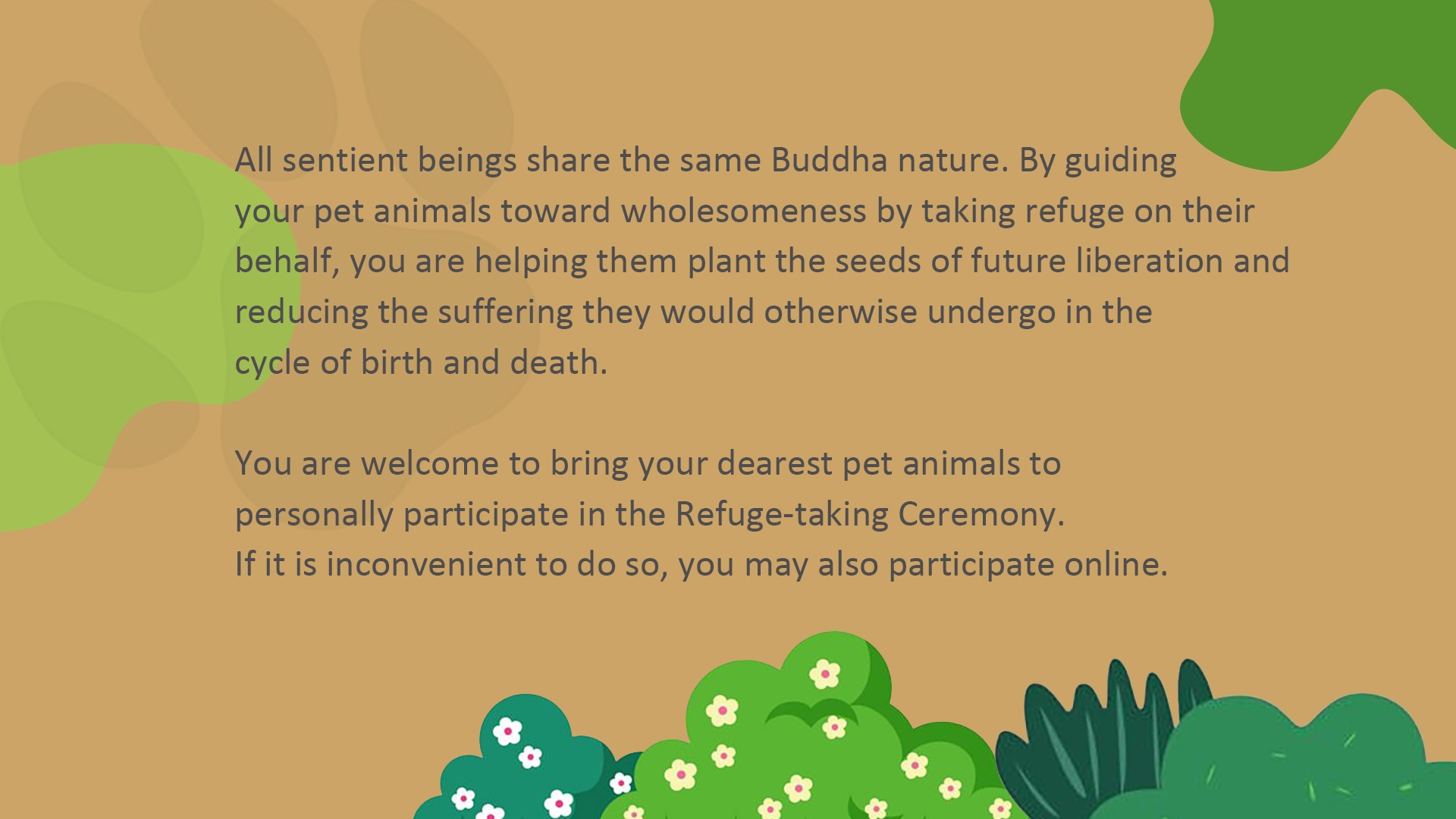
Refuge-Taking Ceremony Without Borders
-
Date:
-
Descriptions:/how to register/
Please complete the registration form
/how to participate/
Participate in-person at the temple, or online.
Taking refuge is the starting point of our Buddhist practice. It enables us to return to and rely on the true principles of the Buddhadharma. Through sincere and respectful participation in the Refuge-taking Ceremony, we pray to evoke mutual Interaction with the Buddhas and Bodhisattvas, and open up a virtuous path to rediscovering our original nature.
-
Calendar:
-
Location:10060 No. 5 Road, Richmond BC V7A 4E5 View Map
-
Live Retreat:
-
Introduction:
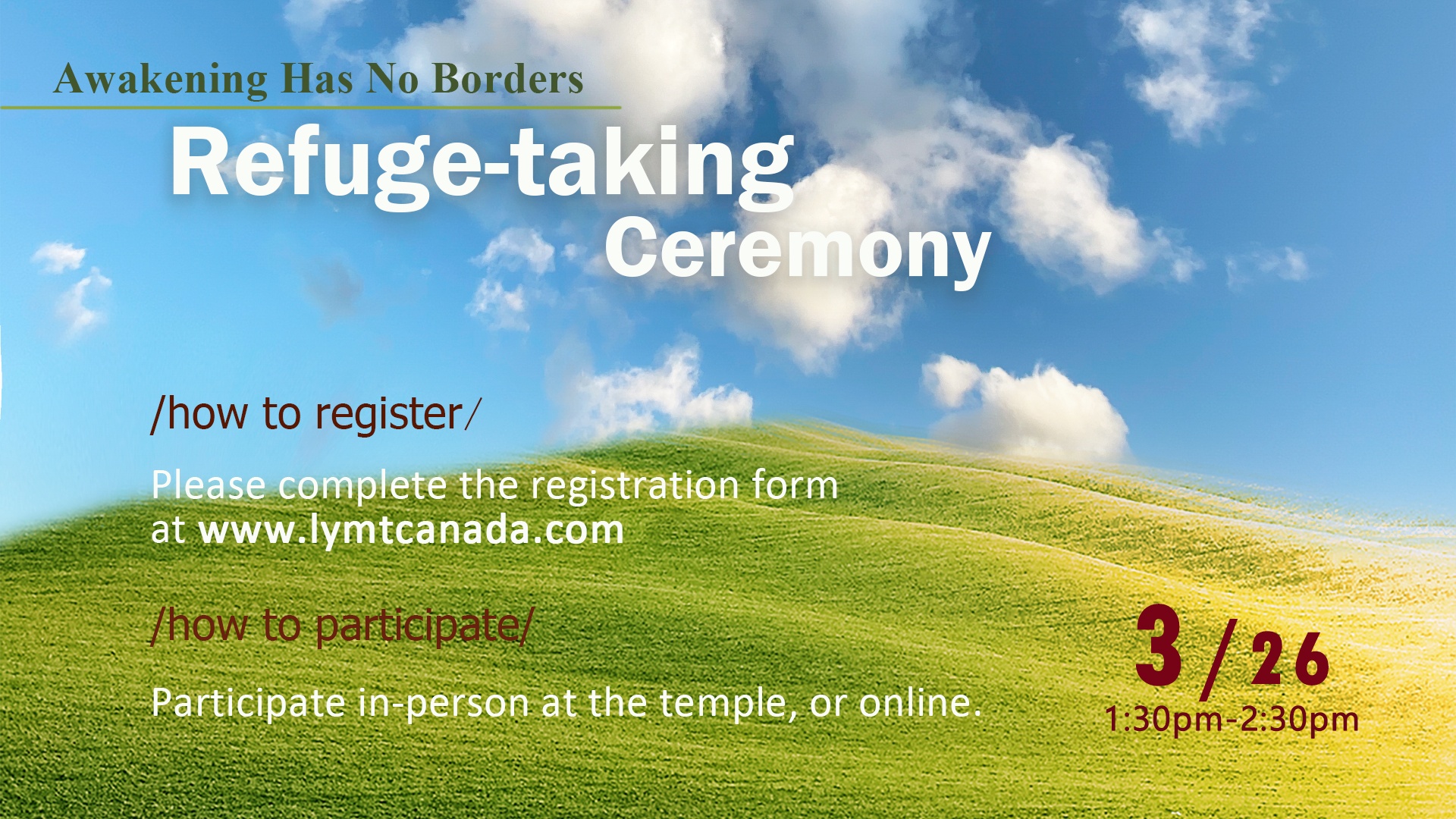
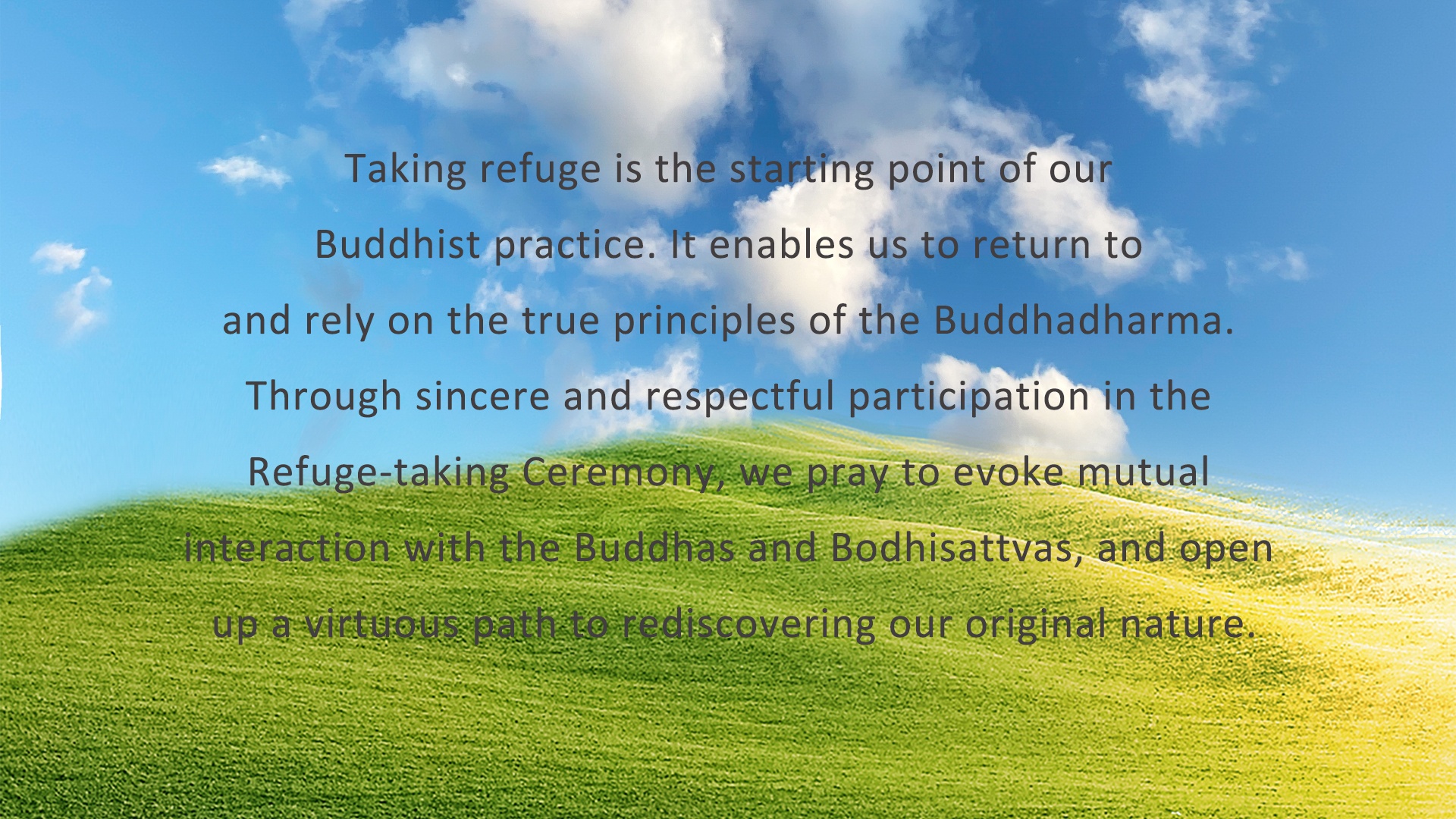
Refuge-taking Ceremony
-
Date:
-
Descriptions:
-
Calendar:
-
Location:10060 No. 5 Road, Richmond BC V7A 4E5 View Map
-
Live Retreat:
-
Introduction:
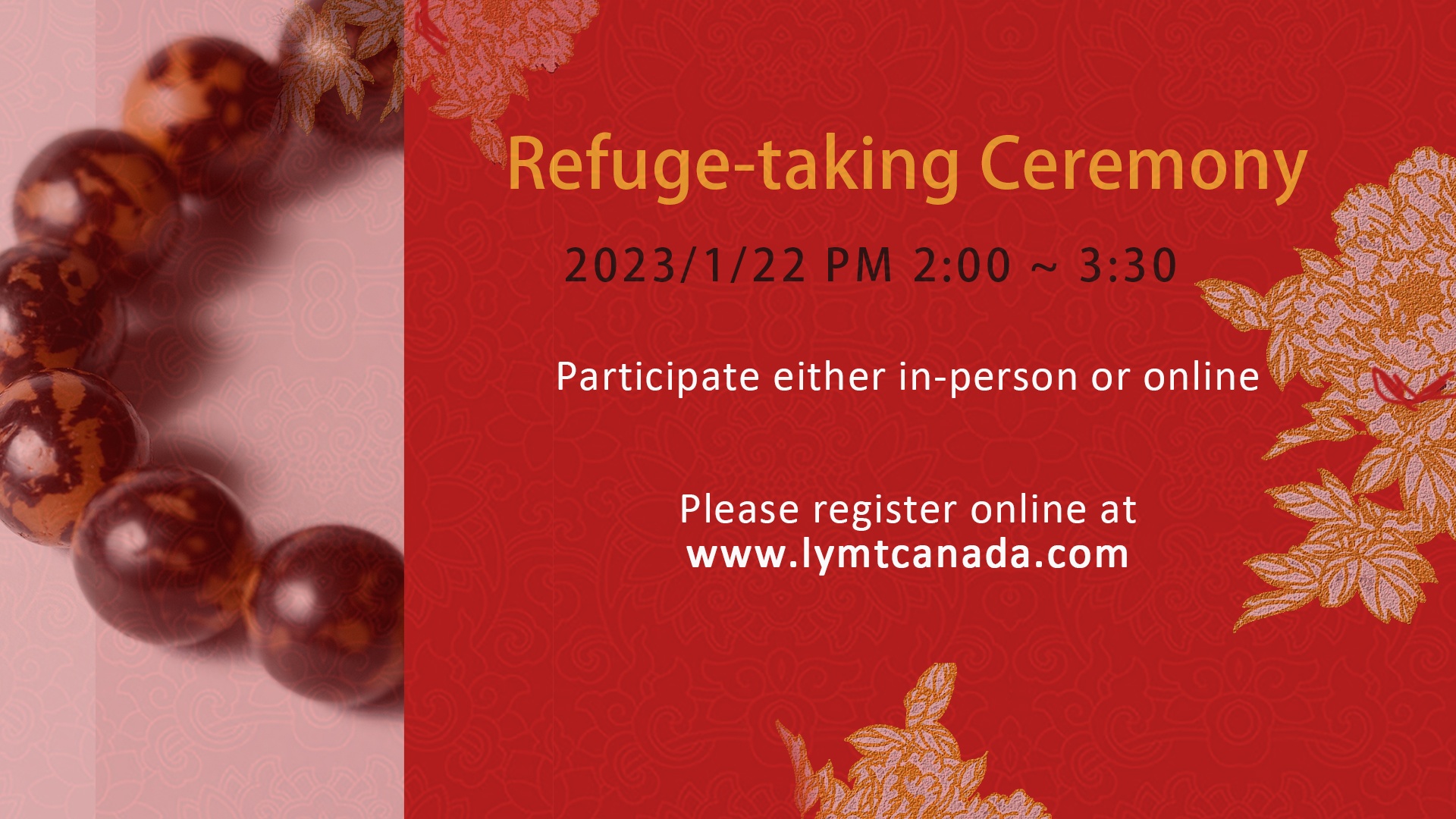
加拿大靈巖山寺皈依報名表/Lingyen Mountain Temple (Canada) Refugee Ceremony Registration Form
Sash-fitting and Individual Photo-taking Registration Form
Individual Photo-taking Registration Form
The Meaning of Upholding Precepts
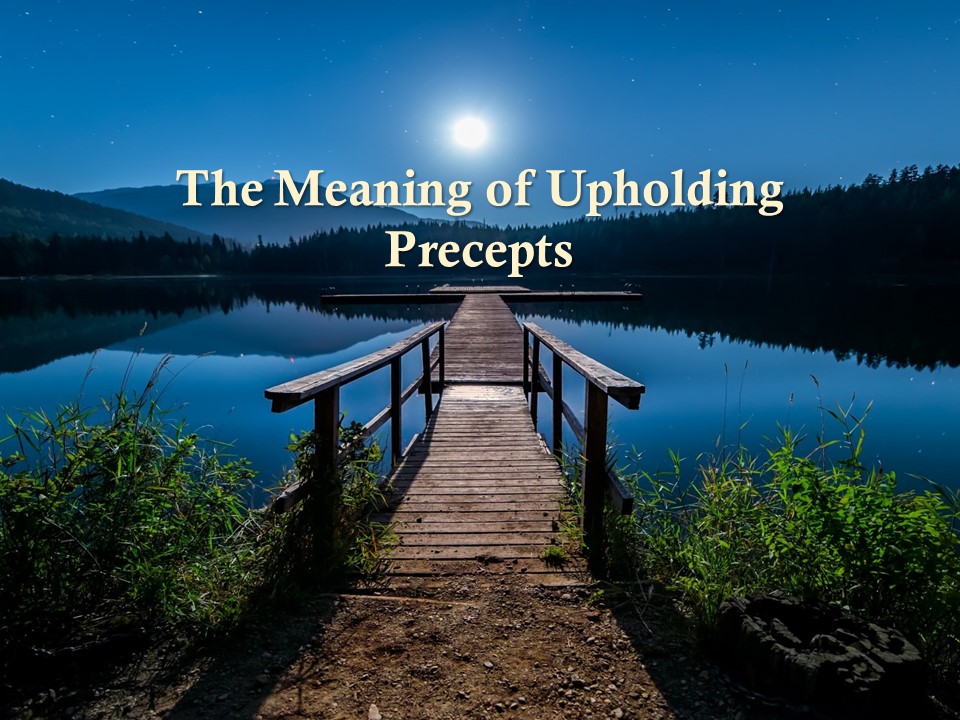
- Introduction
It is said, “Precepts are the foundation of Supreme Bodhi.” Constructing a tall building needs a good foundation; attaining Bodhi requires upholding the precepts. This is why observing the precepts is so important! Why do we need to uphold the precepts? Why do we need to be restricted from doing something? In fact, the precepts teach the best moral conducts, such as doing good deeds and not committing bad ones. In other words, we have to sever all wrongdoings and cultivate all good deeds. It is commonly said, “Do all good and nothing bad.” By upholding the precepts, one can reach the stage of awakening Bodhisattva. Not upholding the precepts, one remains confused and mundane. Those who uphold the precepts can eventually achieve liberation, whereas those who do not would remain as sentient beings subject to the cycle of birth and death. By taking the precepts, one is likely to proceed to the stage of Bodhisattva, or even the Buddha. It is said, “When sentient beings take the Buddha’s precepts, they will eventually become Buddhas.”
The Five Precepts in Buddhism—no killing, no stealing, no sexual misconduct, no false speech, and no intoxication. Observing these Five Precepts is a lifetime undertaking. When you pass away, the Precept Body will be gone. By receiving and upholding the precepts, you will at least retain the human form in the future and not regress to the Three Lower Realms. Being a human makes it easier to practice Buddhism and you will have the seed to attain Buddhahood. Passively speaking, “precept” is to avoid all wrongdoings and evil; proactively, it means both to avoid evil deeds and to do wholesome deeds. To benefit others and oneself, one needs to help other people. By doing so, one will receive blessings. We practice the Bodhisattva Path by helping sentient beings. Hence, we must create positive affinity with others.
The Bodhisattva Precepts include the Six Major Precepts and the Twenty-Eight Minor Precepts. The Monastic Bodhisattva Precepts include the Ten Major Precepts and the Forty-Eight Minor Precepts. Undertaking the Bodhisattva Precepts continues until the future lifetime(s). That is, when you receive the Bodhisattva Precepts this life time, the Precept Body will forever attach with you until you reach Buddhahood. Therefore, this is why the sentient beings, who observe the Bodhisattva Precepts, will reach the beginning stage of Buddhahood. If the Bodhisattva Precepts are observed perfectly and completely, which means that the Buddhahood is perfected. The nature of the Bodhisattva precepts is to bring forth the Bodhi Mind. The Three Collective Pure Precepts is the gist of the Bodhisattva Precepts, such as ceasing the bad deeds, Learning all good deeds, and delivering all sentient beings with compassion. What is the content of Bodhisattva precepts? To practice Bodhisattva path, one must first understand its meaning. What does it take to perfect Bodhisattva path? One must be mindful to attain Buddhahood and to liberate sentient beings. If we want to attain Buddhahood, the first step is to make a Bodhi resolve to benefit others. This is the spirit of the Bodhisattva Precepts.

- Why Take the Precepts?
Precepts in the Buddhadharma are much like laws in the secular world. The purpose of precepts is to protect everyone, just like the laws of a country. While countries have laws, households have rules; every organization has its own set of regulations. Even when we drive, we must follow a certain set of laws. If we do not follow these rules and regulations, our personal suffering may not be a big deal, but we will also affect others.
People may say: “After taking the precepts, if you kill, you will break the precept. In that case, let’s just not take the precepts!” For those who have not taken the precepts, is killing not an offense? This is a fundamental precept. It is not that you only commit an offense after taking the precepts. Regardless of whether or not you are observing the precept, once you commit the act of killing, you will receive harmful karmic retributions. Some may have a mistaken mindset: “Oh! If you break the precept after taking it, is that not an offense in itself?” Of course it is, but if you do not observe precepts, is there no offense in doing bad deeds? In reality, it has nothing to do with whether you observe these precepts. Much like the laws of a country, citizens must follow the law whether or not they understand them, and not following the law means they have broken the law. If you want to live in peace, you follow the law. Do not try the boundaries of the law; likewise, do not break the precepts. Precepts are like guardrails. If you insist on charging towards them, won’t you fall into the pit? Precepts mark the danger zones. You must stop where there are precepts; then you will be safe and at ease.
All Buddhist teachings can be expressed in a single phrase: “Commit no unwholesome deeds, and do all good deeds,” which leads to one word — “precepts.” “Precepts are the roots to the ultimate bodhi,” and once you have the roots, you will eventually have the flowers and the fruits. Therefore, Buddhist disciples with proper faith must take refuge with the Three Treasures; only then will they be Buddhists of correct faith. After taking refuge, we must resolve to take the precepts, as precepts are the roots to the ultimate bodhi. In practicing Buddhism, it is most important to end the cycle of birth and death. The boundless sufferings originate from birth, and when there is birth there is death. That is how it begins and ends, with endless sufferings in between—sickness, all sorts of vexations, unfulfilled aims, being with what we hate—these are all sufferings of the secular world! How do we transcend this birth and death? By practicing Buddhism and observing precepts, we embark on the great compassionate vessel that will lead us out of the sea of suffering. What is the purpose of observing precepts? It is to rid ourselves of suffering.
The spirit of the precepts is to not do to others what we would not wish for ourselves. There are two aspects to this, which fully encompass all teachings of the Buddha. One is the prohibitive aspect, which means putting an end to all unwholesome deeds. There is also the active aspect, which means maintaining the practice of virtuous deeds. As Buddhist teachings state, “Do no bad deeds, and practice all kinds of good.” If we are able to not do bad deeds, then we will not suffer. But that’s not enough! We also want to be happy. In that case, we must practice wholesome deeds. The spirit of precepts reflects the properties of karma: you reap what you sow. So how should you practice? Stop doing bad things. Commit to that, and we will be at ease. Perform good deeds. Commit to that, and we will receive blessings. If we wish for peace and happiness, then we must unconditionally uphold the precepts and share the practice with others. Our individual peace and happiness is not enough; we wish for all sentient beings to have the correct views of the Buddhadharma: that harming others isn’t really harming others, it’s hurting ourselves; helping others isn’t really helping others, it is benefitting ourselves. With this mindset, we will not hurt other people. We will seek out difficult tasks and will not be afraid of hardship when helping others.
With precepts, it’s as if we have railings in dangerous places; we are protected! Before we took the precepts, we accepted ourselves as ordinary people. Now that we have taken the precepts, we are Buddhist disciples; we must honor the Buddhadharma, and be a true Buddhist practitioner. It is not necessary to understand the deeper meanings of the sutras. As long as you can properly uphold precepts, not only will other people be respectful to you, but spiritual beings will also bow to you. The meritorious virtues of the precepts are sacred and revered in that way. These meritorious virtues will stay with you; even if you encounter harmful situations and violate the precepts in the future, they will still be there. You may create unwholesome karma and fall into the hells. However, once you have finished enduring the retributions, then by means of the merits of precepts, you will still be able to practice Buddhism and attain liberation!
Right now, taking the precepts may seem troublesome. As a layperson, there are certainly difficulties in observing the precepts. However, these are only temporary hardships which lead to everlasting liberation. In fact, practicing Buddhism is the greatest joy; it is only due to your usual harmful habits that you feel it is difficult. Only by freeing yourselves from these habitual tendencies will you truly be at ease and happy. Taking the precepts is like returning home, because “Mind is Buddha, Buddha is the mind”. By developing skill through observing the precepts, you will achieve meditative concentration and Prajna wisdom! With the accomplishment of concentration and wisdom, you will naturally end all bad deeds, and practice all good deeds. This is the meaning, spirit, and purpose of the precepts. A concentrated mind is a calm mind. A calm mind is able to settle down. By settling down, you are able to cultivate Right Thoughts. With correct contemplation you will accomplish the Three Non-outflow Studies, and will certainly end the cycle of birth and death—the ultimate reason why you have come here to take the precepts.
After taking the precepts, violating them will result in painful karmic consequences. However, does that mean you can violate the precepts if you don’t take them? It’s like breaking the laws of the country. If you say you do not understand the law, do you get away with it? Once you break the law, you will receive punishment in accordance to the law. You may say: “Oh! I didn’t know!” If Buddhist practitioners break a precept because they didn’t know, they are held responsible for an offense of ignorance. Once you have taken the precepts, they serve as a reminder to be vigilant: “Oh! I have taken the precepts! I need to be careful and not break them.” Without taking the precepts, you might have the negative mindset: “Well, I did not take the precepts, so why uphold them?” So to start, you need to straighten out your views to accord with Right Views; all actions are based on your views. Therefore, you must first cultivate your wisdom. When your wisdom has unfolded, you will cultivate merits and virtues. Only by accumulating merits and virtues will you enjoy peace and happiness!
If one person observes the precepts, one person will be peaceful; if ten people observe the precepts, ten people will be peaceful; if hundreds and thousands of people observe the precepts, then the society, the whole country, and the whole world will be at peace. This is the benefit of Buddhist practice! From the past to the present, monastic practitioners have always prayed for peace in the country during the morning ceremony: “May there be peace at the borders and an end to all wars; may there be good weather and happiness for all people.” If everyone transferred the resources used on military strength and invested them in social benefits, and if everyone acts with courtesy and tolerance, then would this not be a Pure Land on earth.

- The Significance of Taking Refuge during the Precept Transmission Ceremony
You have all lived in society for several decades; where do you find your reliance? Do you rely on your parents? Of course, as infants, children, and adolescents, we rely on our parents. We can rely on our parents, but can our parents help us be free from illness? Can we rely on other practices to be liberated from the suffering of aging, sickness, and death? Of course not! To be liberated from all kinds of suffering, we can only rely on the Buddhadharma. These are the genuine benefits and meritorious virtues that we obtain by taking refuge in the Three Treasures.
Taking refuge in the Three Treasures is a formal ceremony that is part of becoming a Buddhist disciple. It is similar to a convocation ceremony, which formalizes our enrollment in a new school. After entering the school of the Buddhdharma, we need to be both respectful and mindful of the Three Treasures moment to moment, and pray for their support. At the end of every sutra recitation or other Buddhist ceremony, we always take refuge in the Three Treasures. During the transmission ceremony for the Five Precepts, Bodhisattva Precepts, and monastic precepts, the Three Refuges occur at the moment of transmission. In fact, Buddhist disciples should take refuge in every moment. In thought after thought, even great Bodhisattvas do not forget about the Three Refuges. Great Bodhisattvas also pray for the assistance of the Three Treasures in their work of guiding sentient beings. When we take refuge during the transmission of the Five Precepts, we pray that the Buddha, Dharma, and Sangha will support and protect us in receiving the precepts safely and appropriately. We also pray for their support in upholding the Five Precepts well.
What does the word ‘refuge’ mean? In the world, there is nothing but darkness. What is meant by darkness? Darkness represents ignorance, a lack of wisdom. The Buddha is awakened, and signifies a great treasury of radiance and brightness. In darkness, we only create offenses. In brightness, we cultivate virtues. Virtuous deeds generate wholesome karma; offenses generate defiled karma. We are all afflicted, ordinary sentient beings. Even though we have been unknowingly creating karma throughout our lives, we still have some virtuous roots from the past. Now, encountering the Buddhadharma, we have awakened and are willing to go back and take refuge. By taking refuge in the Three Treasures, we have something to rely on. This is the meaning of taking refuge. Having a refuge means having something to rely on, just like a traveler who returns home, and can rely on his parents and family. If you are a disobedient child, or a rebellious student, and have been creating trouble out in society, how dangerous and painful is that! If you can wake up and go home, you will be safe, happy, and at ease. At home, you have your parents’ compassionate protection. As ordinary beings, we have been deludedly creating karma in the sea of suffering, and now we return to our Buddhist home, where the greatly wise and compassionate Buddha will help us put an end to our suffering and enjoy happiness. Everyone who has come to take the precepts is coming home—coming back to your own home, where you can return and rely. Now, by making the determination to take the Three Refuges and Five Precepts, you have truly embarked on the path to going home.
Of course, our real home is the Western Pure Land of Ultimate Bliss. By cultivating according to the precepts, we are turning around and going back—this is “to return.” Just as a wandering child returns home and has his parents and family to rely on, by believing in the Buddhadharma, you have the Buddhadharma, the Three Treasures, and the Buddha to rely on. This is how you will be able to put an end to suffering and enjoy happiness. There is no peace in the Three Realms; they are like a burning house. You must transcend the Three Realms and return to the pure Buddha Land in order to have peace and happiness—this is the meaning of taking refuge. “To return” also means to turn away from the false and return to the true. We have left behind the Buddha’s teachings of awakening, and have practiced confused ways which have led to birth in a human form, subject to suffering in the cycle of birth and death. Now that we are back in our Buddhist home, we practice dharmas of purity which lead to liberation. We will no longer to subject to birth and death. Now that we have awakened and have come back to practicing the Buddhadharma, we have turned away from defilement—the defilements of the six sensory objects of ordinary beings—and united with awakening.
What exactly are the Three Refuges? Externally, we take refuge in the form of the Three Treasures. Internally, we take refuge in the Three Treasures of our essential nature. The Three Treasures are the Buddha Treasure, Dharma Treasure, and Sangha Treasures. The Buddha that you see in the Buddha Hall is the Buddha Treasure, which is carved out of wood or moulded out of clay. Of course, there are also statues made of gold, silver, copper and steel. These are all called Buddha Treasures. The Dharma Treasure refers to the meanings explained in the Buddhist canon. The monastic practitioners who have left home according to the Buddha’s teachings and uphold the monastic precepts are known as the Sangha Treasure. These are the external Three Treasures.
What about the internal Three Treasures? Buddha means awakening, the awakened essence of our self-nature. The Buddha is the awakened nature of our mind. As it is said, “The Mind is Buddha, Buddha is the Mind.” The Dharma Treasure refers to the great, bright storehouse of wisdom within our mind, which clearly sees and understands all things. The Dharma signifies wisdom, and cause and effect; it is the principles of truth. The Sangha represent the Six Harmonies, and cultivating one’s self-nature based on the Buddha and Dharma Treasures. They do not violate the principles of the Six Harmonies. Together, they will realize the unconditioned. This is the Sangha Treasure of our self-nature.
As for the formless Buddha Treasure, do not take it as being nonexistent. In fact, the formless Buddha Treasure is its genuine existence. The perceivable Buddha Treasure is existent in our ordinary eyes, but this existence is an illusory form. “All forms are empty and illusory,” they are not permanent phenomena. The Buddha, Dharma and Sangha Treasure that exist in physical form cannot withstand water and fire. Do not take these forms as the real Buddha and real Dharma. Know that these are illusory forms. However, it is by means of these illusory forms that we come to recognize their genuine, imperceptible form.
The Dharma Treasure of our self-nature refers to the great, bright storehouse of wisdom within our mind. Furthermore, this brightness is wisdom. Wisdom is not what we would typically refer to as cleverness, as one may become the “victim of one’s own cleverness.” Actions that come out of wisdom are not for the sake of our own happiness. They are for the sake of others’ happiness as well. I often say, “The seas of all merit and virtue come about from Prajna.” Prajna is wisdom and brightness. If we use our inherent great, bright storehouse of wisdom, we will generate only virtue and nothing unwholesome. We will repent and reform our karmic offenses of the past, and increase our meritorious virtues of the future. This is the Dharma Treasure of our self-nature. Even though it is formless, it has such meritorious applications.
As for the Sangha Treasure of our self-nature, the Sangha signifies purity. The defilements in the world are not inherent in our nature! Our essential nature is completely pure. However, deluded thoughts, ignorance, and mistaken views have arisen just like dark clouds in the sky, smoke and pollutants in the air, which were originally not there. Due to mistaken views, we have engaged in wrongdoing, but our essential nature is still pure! It is because our essential nature is pure that we should transform and put an end to those impurities, and restore our inherent purity.
In fact, the Three Treasures are of one essence. This single essence is divided into different functions. Even though we speak of different functions, they are still part of the same great function of the one essence. When the Three Treasures of our self-nature are pure, they are precepts, concentration, and wisdom. If they are impure and confused, they are the Three Poisons [greed, anger, and ignorance]—this brings about afflicted ordinary beings. Now, we want to eliminate the Three Poisons and cultivate precepts, concentration and wisdom, be liberated from transmigration in the Six Paths, and restore our original essence. Our original essence is the Three Treasures of our self-nature.
We are now ordinary beings, and have yet to understand the principles of the nature of emptiness and dependent origination. We take everything as having a form, and we practice relying on forms. By relying on the external aspects of the Three Treasures as conditions, we inspire the unconditioned Three Treasures within our mind—the Three Treasures of our self-nature. We take refuge in the external forms, and from there we return to the formless—the genuine Three Treasures that are without form.
Where do we start? Start practicing from our self-nature. Taking refuge in the Three Treasures is taking refuge in the Three Treasures of our self-nature. During ceremonies, we recite, “I take refuge in the Buddha, I take refuge in the Dharma, I take refuge in the Sangha.” Now that we have taken the precepts, we still need to return and rely on the Three Treasures. We must not act upon the Three Poisons. When the Three Poisons of greed, anger and ignorance fire up, we commit acts of killing, stealing, and sexual misconduct.Everyone, you have finally awakened! If you had not awakened, how would you come to take the precepts? You have realized that this world is not a place to settle down; the Buddhadharma is your genuine place of refuge. You have awakened to and understood the Buddhist principles, and practice according to the teachings. As a lay disciple of the Buddha, by supporting the Three Treasures, you are ultimately supporting the Three Treasures of your essential nature. In the secular world, we serve others as a means to benefit ourselves; by benefiting others, we benefit ourselves. By supporting the Three Treasures, we reveal the Three Treasures within our own mind. If we diverge from the Three Treasures, we are in conflict with the nature of reality. By turning greed, anger and ignorance around, and instead cultivating precepts, concentration and wisdom, we are truly protecting and revering the Three Treasures.

- The Significance of Taking the Five Precepts
In Buddhism, the Five Precepts prohibit killing, stealing, sexual misconduct, lying, and use of intoxicants. The Five Virtues of Confucianism are benevolence, righteousness, propriety, wisdom, and trust. Not killing corresponds to benevolence, not stealing demonstrates righteousness, not committing sexual misconduct is propriety, not lying signifies trust, and not using intoxicants preserves our wisdom—by maintaining a sharp mind. The first four precepts are known as the “fundamental precepts,” and the final precept against intoxicants is the “preventative precept.” Why is this preventative precept listed along with the fundamental precepts? In order to maintain purity and ease in our observance of the first four precepts, we cannot be confused in our sense of judgment—we need to be in control of our minds. Intoxicants cause us to be disoriented and lose self-control. In that case, it is very difficult to maintain any of the first four precepts. Therefore, the precept against intoxicants is included in the Five Precepts.
When we take the Five Precepts, with each precept we will have five Dharma-guardian deities protecting us. By virtue of taking the precepts, we will not only have protection from Dharma-guardian deities, but we will also gain the heartfelt respect of wicked people who learn about the merits of your precept observance. Precepts carry the precept fragrance. After we take the precepts, this true fragrance fills all spaces. Most ordinary fragrances are carried along with the wind, but precept fragrance is detectable even against the direction of the wind—it permeates all places.
Taking the precepts prevents us from committing offenses and puts an end to unwholesomeness. They enable the removal of unwholesome karma, and facilitate advancement in the cultivation of virtuous karma at the same time. The Precept Body that one receives after taking the precepts prevents the arising of harmful conditions, and stimulates wholesome conditions. It keeps the body and mouth in control, using the golden chain of the Five Precepts. It prevents the body from killing, stealing, and sexual misconduct, and prevents the mouth from engaging in double-tongued speech, harsh speech, lying, and frivolous speech. This is the spirit of the Five Precepts.
Taking the Five Precepts is the best insurance. What does it insure? It insures against falling into the Three Lower Realms. Purity in observance of the Five Precepts ensures rebirth as a human being; cultivation of the Ten Wholesome Deeds guarantees rebirth in the heavens. The Five Precepts are the cause that enable one to maintain a human form and not fall into the Three Lower Realms. These are the meritorious virtues of the Five Precepts.
The Five Precepts are fundamental, regardless of whether you believe in the Buddha or not. Even as an ordinary human being, you must not do these things. If you do, you harm both yourself and others. It is not that only Buddhist practitioners need to uphold the Five Precepts. Violating these precepts causes you to fall into the hells. You need to understand that, whether or not you take these fundamental precepts, abiding by them keeps you away from trouble. Furthermore, if you are able to cultivate virtuous deeds, you will gain blessings and wisdom. By taking and honoring the Five Precepts, you perfect your character. A person with perfect character will surely be reborn as a human being and will not fall [into lower realms]. Abiding by the precepts ensures that you will not fall; putting them into practice will enable you to advance.
Taking the Five Precepts cures illnesses of the body. If you want to have a healthy body, you need to follow these methods. This is the way to go; do not deviate from this path. If you are pure in your observance of the Five Precepts, you will definitely be in good physical health. These are the basic responsibilities of human beings.
Of course, everyone is affected by karmic influences. In the past, we have created negative karma. Even though we have now come to cultivate virtues and improve ourselves, we will not immediately experience happiness and ease. Buddhist teachings on cause and effect advise us to cultivate according to the precepts and completely eliminate karmic offenses from the past. Only then will we be able to, through our cultivation of virtuous deeds, gradually transform our suffering into happiness. We should understand this and stay determined in our precept observance. Through consistent practice, even the gravest karmic offenses will be eliminated by virtue of the precepts.
When you take the Five Precepts, you can choose to uphold them fully or partially. These variations are in response to the differences in individual circumstances. You need to exercise flexibility in that, even if you cannot abide by a certain precept, you can still uphold the rest of the precepts. Observing one precept generates the merit from that one precept! If you truly cannot uphold one of the precepts, then do not take that precept; but understand that this is a last resort. Remember, the Five Precepts are fundamental precepts; it is best that you do not violate any one of them. If you are not of strong character, and are not courageous enough to step out of the circle of secular sentiments, then [taking only a part of the precepts] is an expedient means. It is better than being too strict, and driving people far away from the practice. This is also an example of the vastness of the compassion of the Buddhadharma, keeping in mind that compassion and flexibility are exercised only when appropriate.
Losing the precepts means that you lose the precept fragrance. The precept-guardian deities are not as compassionate as the Bodhisattvas. If you are pure in your observance of the precepts, they will definitely be very happy to support you. If you do not uphold the precepts, they will be angry and leave. They will not support you anymore! What should you do if you make a mistake? Immediately repent and reform. Through repentance, you will be able to restore your purity. As it is said, “By repenting for one’s mistakes, one regains peace and happiness.”
Precepts are to be observed for life. As soon as you forget about them, you will stray off track—this is very dangerous, because karmic forces are very powerful. The strength of karma rivals the highest mountains, and runs deeper than the greatest oceans. It can obstruct the cultivation of the sagely path. What can we do about it? Karma is created by our own minds. The only person who can remove the bell [from around the tiger’s neck] is the one who tied it there in the first place. Only you can eliminate your negative karma. By coming to take the precepts, you are coming to eliminate the karma you have unknowingly created throughout the past.
Taking the Five Precepts is the first step in practicing the Buddhadharma; it is also the initial foundation of all Buddhas of the past, present, and future. For example, to build a jeweled stupa, the precepts would be like the baseboard on the very bottom. If you only take the Five Precepts, and fully uphold them as a layperson, you can maintain rebirth in a human form. As it is said, “A ten-thousand foot skyscraper begins from the ground; Bodhi and Nirvana begin with precepts as their foundation.” If you wish to realize Bodhi, meaning Buddhahood—Buddha means awakening—the foundation to becoming a Buddha is in making this significant move. With accomplishment in precept observance, there comes meditative concentration and wisdom. With meditative concentration and wisdom, you will naturally put an end to all unwholesomeness and cultivate all kinds of virtuous deeds. This is the significance, spirit, and ultimate purpose of the precepts. A concentrated mind is a calm mind. A calm mind is able to settle down and practice Right Contemplation, with which comes the accomplishment of the Three Non-Outflow Studies of precepts, meditative concentration, and wisdom—which naturally leads to ending the cycle of birth and death. This is why you have come to take the precepts.
Lingyen Mountain Temple (Canada) 23rd Anniversary Pilgrimage
-
Date:
-
Descriptions:Three-Steps-One-Bow around the temple in homage to Guan Yin Bodhisattva
First session: 9:30AM
Second session: 1:30PMDelicious lunch boxes and Noodles of Peace will be served to all those who attend. Please register here
Every year during the Anniversary Pilgrimage, Lanterns of Peace will be put up all around the temple, inspiring the inherent light of wisdom within us. We welcome everyone to make a contribution toward these lanterns as an offering to the Three Treasures, and a prayer for peace in the family.
The lanterns will be put up from 8/20-9/19
-
Calendar:
-
Location:10060 No. 5 Road, Richmond BC V7A 4E5 View Map
-
Introduction:
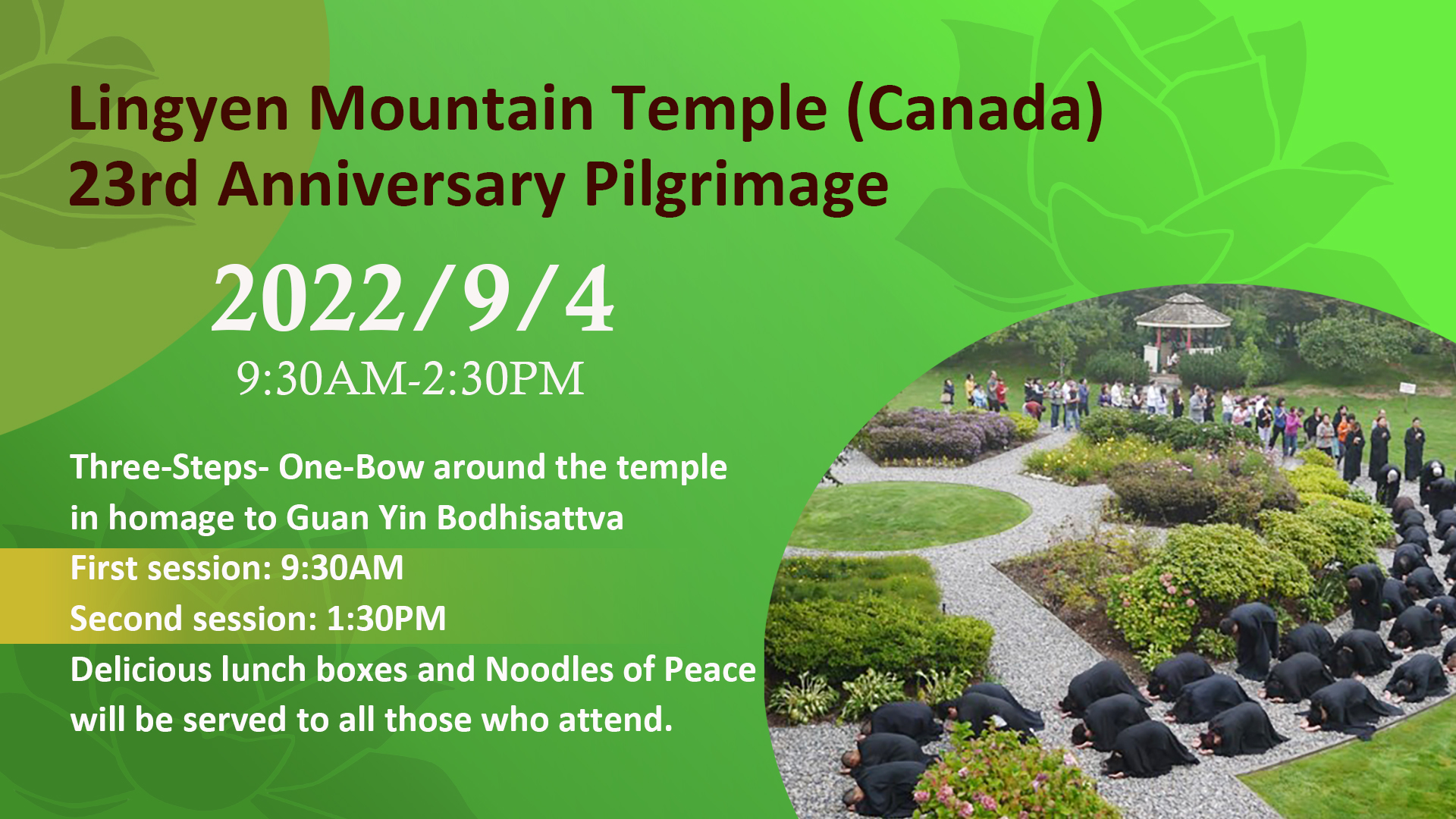
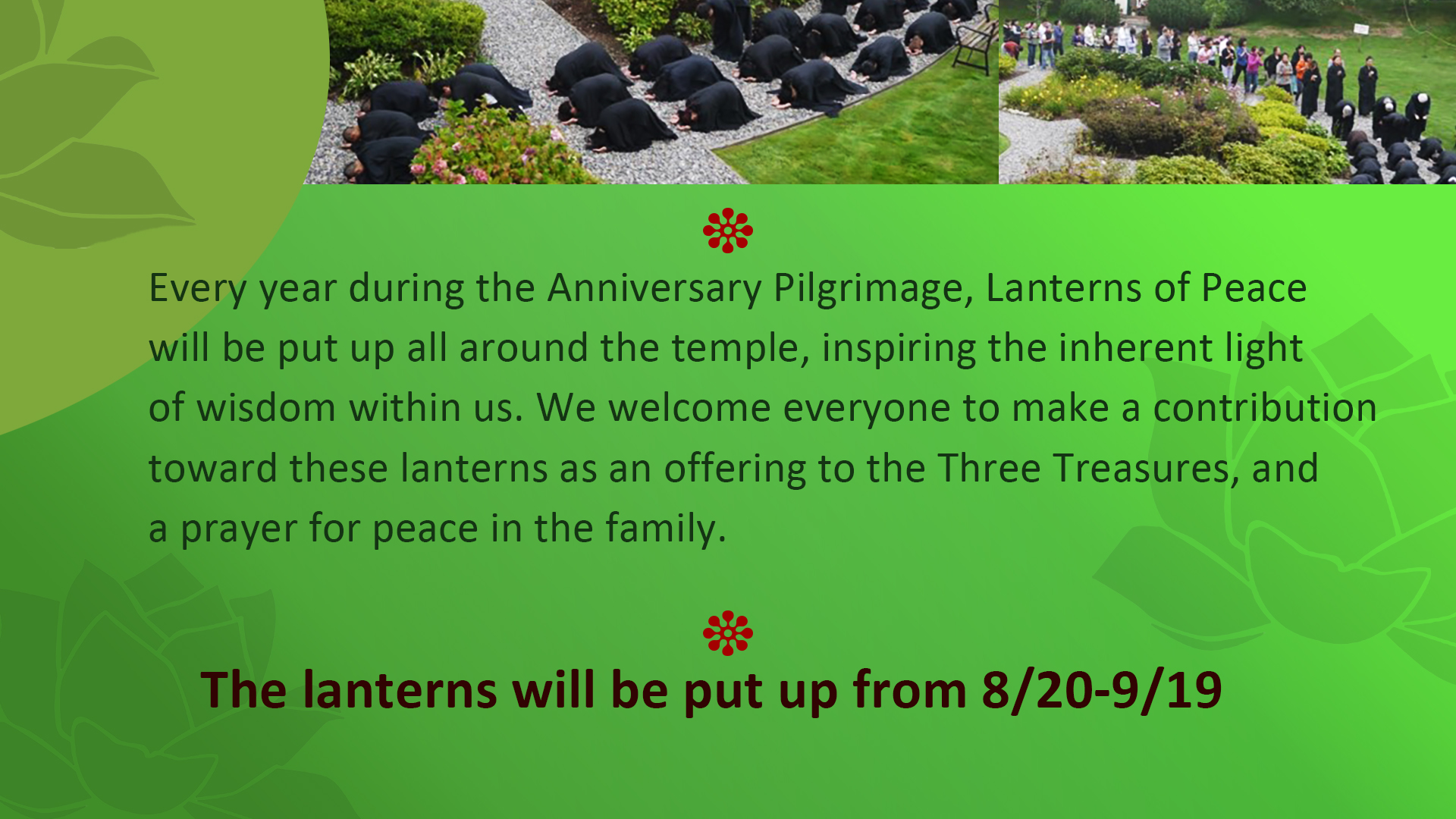
建寺二十三週年紀念朝山活動報名表/Lingyen Mountain Temple (Canada) 23rd Anniversary Pilgrimage Registration Form
Five Precepts / Lay Bodhisattva Precepts Transmission Ceremony
-
Date:
-
Descriptions:Precepts are the foundation to Bodhi and Nirvana
Register online or at the temple
Buddhists with proper faith in the Three Treasures, over the age of 12, in good physical and psychological health.
Those who have taken the precepts before may participate as well. Space is limited. (Children ages 7-12 must be accompanied by a parent. Their participation is subject to approval by the Precepts Transmission Committee.)
Prior to the event, participants must attend a preparatory course explaining the precepts and the meaning of taking the precepts. Details will be provided on the temple’s official website. The temple will also notify participants by email.
The Meaning of Upholding Precepts
-
Calendar:
-
Location:10060 No. 5 Road, Richmond BC V7A 4E5 View Map
-
Download:
-

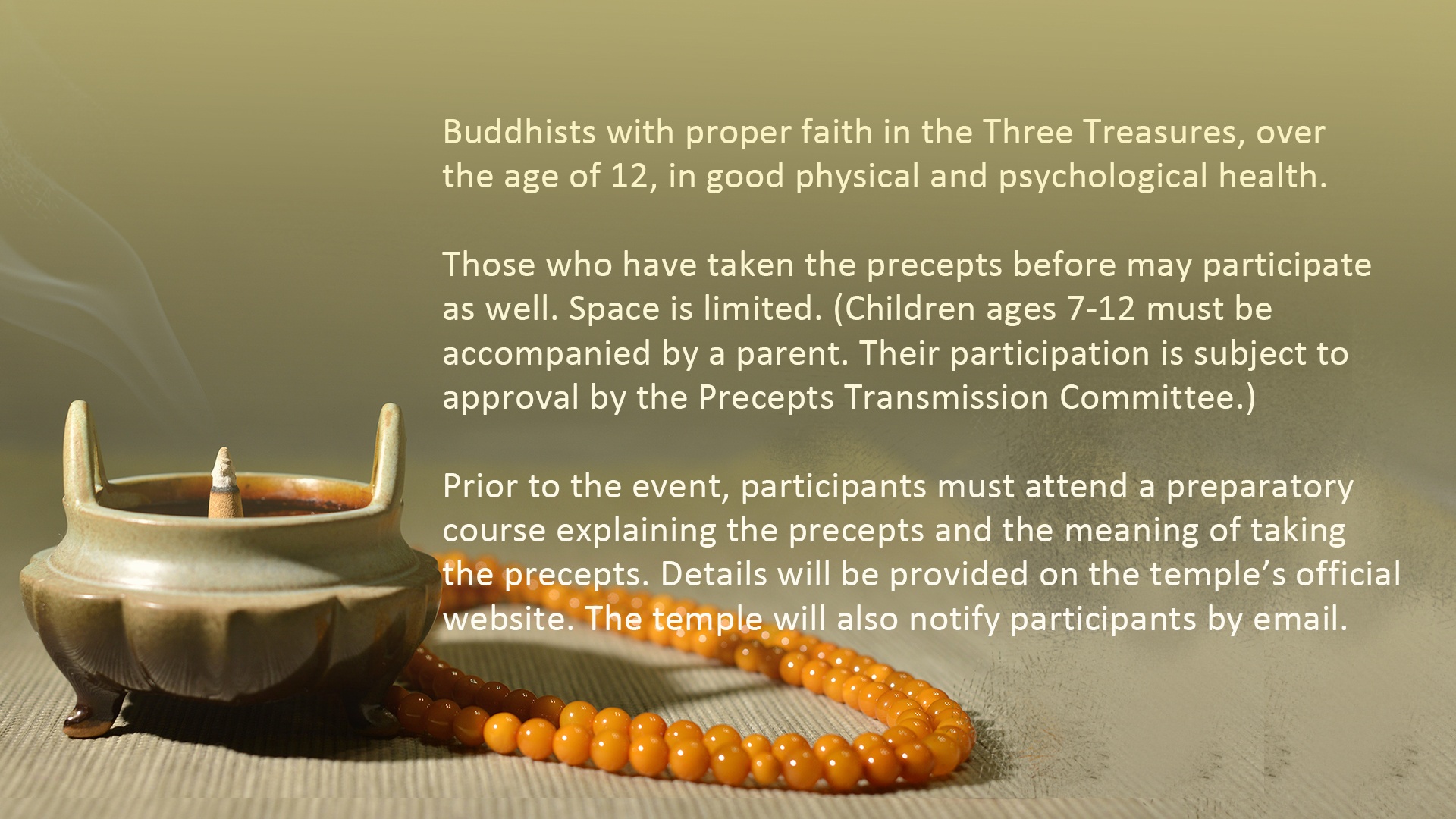
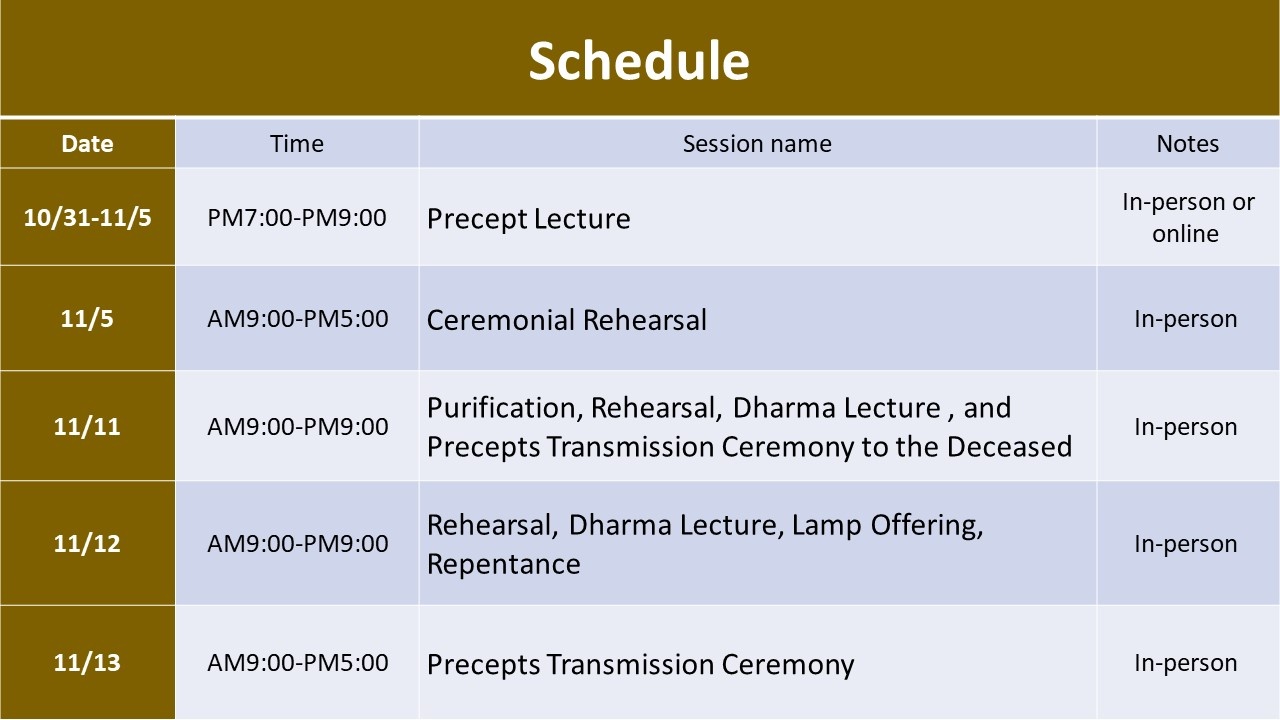
-
Date:
-
Descriptions:Precepts are the foundation to Bodhi and Nirvana
Register online or at the temple
Buddhists with proper faith in the Three Treasures, over the age of 12, in good physical and psychological health.
Those who have taken the precepts before may participate as well. Space is limited. (Children ages 7-12 must be accompanied by a parent. Their participation is subject to approval by the Precepts Transmission Committee.)
Prior to the event, participants must attend a preparatory course explaining the precepts and the meaning of taking the precepts. Details will be provided on the temple’s official website. The temple will also notify participants by email.
-
Calendar:
-
Location:10060 No. 5 Road, Richmond BC V7A 4E5 View Map
-
Download:
-
-



Recite the Earth Store Sutra and Earth Store’s Name Dedicate the merits toward resolution of the worldwide pandemic
-
Date:
-
Descriptions:
The Earth Store Sutra explains principles of Cause and Effect, bringing benefits to those who recite it as well as their relatives and foes of past lifetimes.
Please encourage your friends and family to participate.
In midst of the pandemic and disasters throughout the world, the temple is encouraging everyone to make a determination to recite the Earth Store Sutra and Earth Store’s name from July 18th to August 27th. Dedicate the merits of this practice toward the resolution of these, and peace and happiness for all sentient beings. The temple will announce the names of all participants during the final Dedication of Merits on the last day of the Earth Store Dharma Service, August 27th. Please encourage your friends and family to recite as well, and register the number of recitations on the form.
-
Calendar:
-
Introduction:
